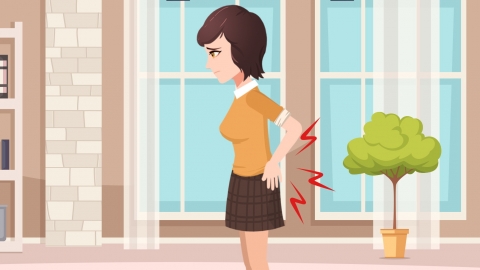What department should you visit for lower back pain?
Generally speaking, for lower back pain, you can visit departments such as orthopedics, rehabilitation, urology, rheumatology and immunology, or gynecology. If discomfort occurs, timely medical attention is recommended. Detailed analysis is as follows:

1. Orthopedics
Lower back pain caused by long-term physical labor or maintaining a fixed posture for extended periods may be due to spinal conditions such as lumbar muscle strain, lumbar vertebral fracture, lumbar disc herniation, or lumbar spondylolisthesis. Orthopedic doctors have specialized knowledge and experience in diagnosing and treating these conditions and can determine the cause through detailed physical examinations and imaging studies.
2. Rehabilitation
If the lower back pain is caused by muscle tension or poor posture, the rehabilitation department may be appropriate. Rehabilitation physicians may employ physical therapy methods such as heat application, massage, traction, acupuncture, and physiotherapy to relieve muscle pain, improve blood circulation in the lower back, strengthen back muscles, correct poor posture, help patients regain normal back function, and improve quality of life.
3. Urology
If severe colicky pain in the waist is accompanied by hematuria, difficulty urinating, or a history of kidney stones, urinary system diseases such as kidney stones or hydronephrosis should be considered. Urology can confirm the diagnosis through ultrasound, urinalysis, and other tests and relieve the obstruction through medication or surgery.
4. Rheumatology and Immunology
If there is pain in the lumbosacral area accompanied by morning stiffness that improves with activity, or difficulty squatting, it may be a rheumatic disease such as ankylosing spondylitis. Rheumatologists can assess inflammation through blood tests and imaging studies and develop anti-inflammatory or immune-regulating treatment plans.
5. Gynecology
Certain gynecological diseases in women can also cause lower back pain, such as pelvic inflammatory disease, endometriosis, uterine fibroids, and ovarian cysts. These conditions may cause pelvic congestion and inflammation that irritates surrounding tissues, leading to referred pain in the lower back. This is often accompanied by lower abdominal pain, menstrual irregularities, and abnormal vaginal discharge. Obstetricians and gynecologists are familiar with the anatomy and physiology of the female reproductive system and can diagnose and treat gynecological conditions through gynecological exams and ultrasound.
Patients with lower back pain should choose the appropriate department based on their specific symptoms. Before visiting a doctor, patients can perform a preliminary analysis of their symptoms to more accurately select the appropriate medical department.







